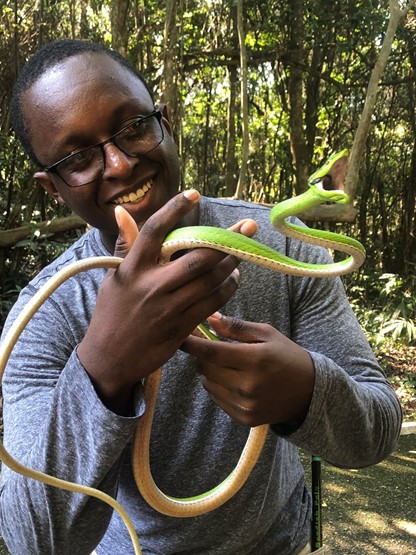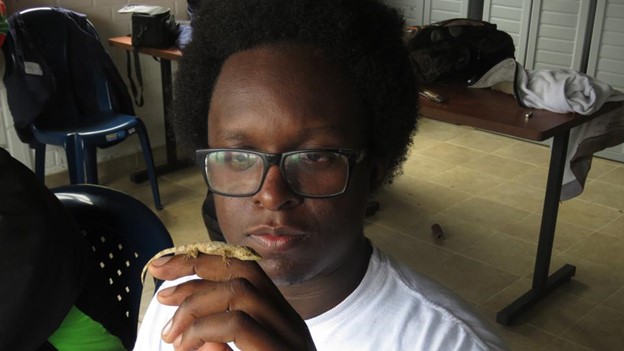For Black History Month, the British Ecological Society (BES) journals are celebrating the work of Black ecologists from around the world and sharing their stories. This post is from Jhan Salazar, a PhD student at Washington University.
Hi, I’m Jhan! I’m an Afro-Colombian ecologist, and I’m a PhD student in Jonathan Losos’ Lab at Washington University in St Louis. My research is focused on exploring the effect that temperature and climate have on the ecology and evolution of tropical lizards. I was born in Puerto Tejada, Cauca (Colombia), and unlike many of my peers, the story of why I became an ecologist and evolutionary biologist started long before I went to university or even to school. When I was five years old, I went to the most beautiful place I have ever been: my parents and grandparents’ hometown. In this small town called Boca de Patía, which is also in the Cauca region, I saw for the first time a forest – a tropical rainforest – and met many of its unique inhabitants: snakes, poison dart frogs, and many other fantastic animals and plants. After being there I started watching as many nature documentaries as I could, which made me wonder why none of the scientists on these documentaries looked like me.

In Colombia, we – black people – comprise approximately 10% of the country’s population. In other words, we are around 4.6 million Afro-Colombians, of which 55% of us live in poverty. Only 20% of all Afro-Colombians go to the university, however, less than that original 20% graduate. The opportunity for Afro-Colombians to attend graduate school is even lower; to give you an idea, my mom never went to school as child – now she is going to school at the age of 47 – and my dad graduated from high school at the age of 25. For that reason, my dad used to tell me when I was a kid: “as a black man in this country – Colombia – we have to work twice as hard to get half as far”.
The opportunity for Afro-Colombians to attend graduate school is even lower; to give you an idea, my mom never went to school as child – now she is going to school at the age of 47 – and my dad graduated from high school at the age of 25.
In 2013, when I was 17, I won a scholarship to study Biology at the Universidad Icesi in Cali, Colombia – otherwise, I do not think I would have been able to go to University; going there was a dream come true. Nevertheless, during my five years in Universidad Icesi – in Colombia most undergraduate degrees last five years – I did not have any black professors, even living in a city where more than one in four people are black. Somehow, during my time in the undergrad I had the great opportunity to visit the US twice as an intern. The first time I went to Purdue University to work in Michael Mickelbart’s Lab studying stomatal traits and water use efficiency of maize. The second time I had the opportunity to visit was in the last semester of my undergrad, where I conducted research on the ecology and evolution of thermal physiology of anoles in Martha Muñoz’ Lab at Virginia Tech (Martha is now an assistant professor at Yale University). It was there in Blacksburg where I personally met for the very first time a black evolutionary biologist, Professor Scott V. Edwards. After many years of watching wildlife documentaries and studying these topics, this was the first time I felt represented as a biology student. It was a profound moment for me. However, I still have not yet personally met an Afro-Colombian ecologist or evolutionary biologist, so I hope this will soon change.

It was during my time at Virginia Tech where I thought about going to grad school, mostly because Martha encouraged me to do it. After finishing my undergraduate studies, I decided to apply to Martha’s lab and to Jonathan Losos’ Lab in Washington University in St. Louis – I knew his name because one of my undergrad classes featured one of his books. I was admitted in both labs, creating a very difficult decision for me – after a long deliberation in 2019 I decided to go to Washington University. In that same year, my first paper ever was published in Evolution, in which Martha, Gustavo Londoño, Rosario Castañeda (my advisors in Colombia), Brooke Bodensteiner (Martha’s grad student) and I explored if the evolution of thermal physiology differed between Neotropical lizards from Caribbean islands and their counterparts from mainland tropical America. It was a privilege to have such amazing colleagues for my first lead-author paper.

Moving from Colombia to the United States was a big change, not only because the language was different but I was also concerned about the racial discrimination that I thought I was going to face – in Colombia I am only black, here I’m black and Latino. However, in the bubble of academia I have felt good; people in my department treat me well and I feel comfortable when I’m inside the buildings of the university. However, when I’m outside – when I’m just a regular person walking in the street – things are different. I have noticed and felt how people look at me in a different way; when I’m buying something or talking to someone, sometimes I have had to hide my accent because some people say they do not understand what I’m saying or some other times I just prefer not to say a word. It’s difficult for me to hide a part of who I am, just because I do not want to feel discriminated. But as much as I can hide my accent, I cannot hide my blackness. One day I will leave USA, and I might not be worried about being racially discriminated again, but there are millions and millions of black people that are from here and live here in the United States of America and they have to and may continue to suffer this discrimination almost every day. I just hope that one day this will end, not only in the USA but in Colombia and the rest of the world, because I know that we are the generation of change.
It’s difficult for me to hide a part of who I am, just because I do not want to feel discriminated. But as much as I can hide my accent, I cannot hide my blackness.
Even though I have experienced discrimination in the US, it is important for me to also be clear about my positive experiences here. I have met many Colombian scientists in the Missouri Botanical Garden and one of the professors of my graduate program at WashU is Colombian – Dr. Carlos Botero– who also happens to know my advisors in Colombia. In these 14 months that I have been in grad school I have learned a lot of things that otherwise I couldn’t have learned in Colombia, not only about science, but the English language and the history of St. Louis too. I feel that my English has improved a lot compared to when I came to the country for the first time. Also, I have enjoyed my time so far in the Losos Lab; I have learned a lot from Jonathan, the postdocs, and the other grad students. Working with Jonathan was another dream come true for me. I want to encourage not only Afro-Colombians or Colombians but everyone from different countries and backgrounds that science is for all.
Now that I am on my way to obtaining a Ph.D. in Ecology, Evolution, and Population Biology at Washington University, I feel that being represented makes a huge difference in how to face this new stage of life. At the beginning of 2020 a new professor was hired in our department; her name is Swanne Gordon, a Canadian scientist of Jamaican descent. When I found out that Dr. Swanne was hired, I felt so excited and happy because I knew that after seven years of being a student in science, I finally met someone that looks like me in the same department I am part of. Also, during this year living in the United States I have met and discovered many other black scientists doing great science thanks to WashU and Twitter. I feel that there are more and more black people in the scientific community, not only in the US but in Colombia too; in 2019, I was honored to be named as one of 12 Afro-Colombians of the Year. In my particular case, I won the award in the Youth Category by the El Espectador and La Fundación Color de Colombia, owing in part to my record of scientific publishing. I had the opportunity to meet a lot of Afro-Colombian scientists working on chemistry, engineering, medicine, and politics and economics.
I do science for many reasons, but the main one is because of a promise I made to my parents after I graduated from undergrad.
If I could go back in time, I would say to myself that even when it looks impossible, it is important to just keep moving forward. This is especially true because there were many times where I just wanted to give up, I thought that science wasn’t for me, and that only smart people do science. However, now I know that conducting science is a mixture of courage, discipline, creativity, and imagination; it is accessible to anyone if given the opportunity. I do science for many reasons, but the main one is because of a promise I made to my parents after I graduated from undergrad. I told them that at some point in my career I wanted to go back to their hometown to do research there, and I want to show people from my community and my family that even though it is difficult to have big dreams and high hopes, anything is possible.
